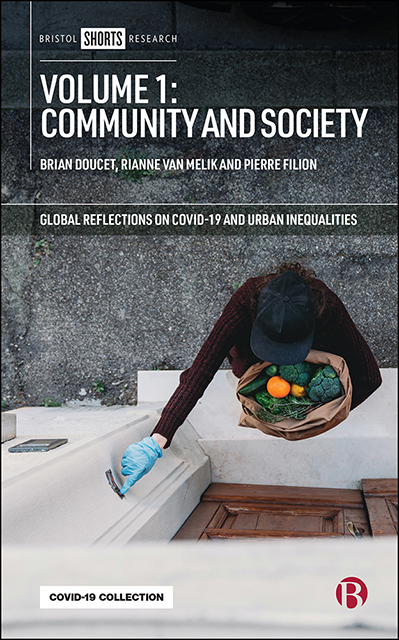Book contents
- Frontmatter
- Contents
- List of Figures and Tables
- Notes on Contributors
- Acknowledgments
- Preface to All Four Volumes of Global Reflections on COVID-19 and Urban Inequalities
- One Introduction
- Part I Working Practices
- Part II Life During Lockdown
- Part III Migration, Migrants, and Refugees
- Part IV Age, Race, Gender, and Ability
- Index
Sixteen - Singapore’s Pandemic Governance and Deepening Marginalization of Migrant Workmen
Published online by Cambridge University Press: 13 April 2023
- Frontmatter
- Contents
- List of Figures and Tables
- Notes on Contributors
- Acknowledgments
- Preface to All Four Volumes of Global Reflections on COVID-19 and Urban Inequalities
- One Introduction
- Part I Working Practices
- Part II Life During Lockdown
- Part III Migration, Migrants, and Refugees
- Part IV Age, Race, Gender, and Ability
- Index
Summary
Introduction
In the early stages of the COVID-19 pandemic in February 2020, Singapore appeared to have control over the spread of the virus among the general population. This changed quickly, however, in late March 2020, when several new clusters of infection emerged, and the number of cases soared. By early April, Singapore had one of the highest rates of infection per capita of anywhere in the world. Beneath this startling statistic is a complex picture of migrant worker infection clusters connected to a structural and institutional history of socio-spatial exclusion and economic marginalization (see also Azlan, Chapter Fourteen). It is this structural regime that arguably helped produce a situation by April 2020, where over 90 percent of Singapore's infections and all major infection clusters were located among the thousands of transient migrant workmen, predominantly from South Asia, working in the city state.
The chapter examines the governance of migrants through urban space in ‘pandemic times’. Migrant workers represent a group with heightened vulnerability to infection due to their precarious working and living conditions. I argue that this vulnerability, as well as the early responses to the pandemic, which largely excluded migrant workers, has produced intense pandemic governance of migrant workers vis-à-vis the citizen/permanent resident population. I argue that these two aspects of migrant worker precarity are mutually reinforcing; vulnerability to infection is shaped by a pre-existing political economy of governance that contains and marginalizes migrant workmen, with responses to this heightened vulnerability reinforcing and exacerbating these very same processes of containment and marginalization. In the chapter I draw out how these processes are simultaneously spatialized and racialized and suggest they may help perpetuate a divisive post-pandemic urban governance of migrants.
The chapter first briefly reviews the racial/migrant context of Singapore and policies aimed at the spatialization of difference. I then examine the living and working conditions of these migrant workmen in Singapore to help explain the prevalence of COVID-19 infections among this sub-population. In this part of the chapter I pay particular attention to the spatialization of migrant workmen's working and living conditions and the causality of these situations in the current infection trends. The third part of the chapter examines the measures to contain the spread of COVID-19 and reduce infection rates in the city state that were introduced in the second quarter of 2020.
- Type
- Chapter
- Information
- Volume 1: Community and Society , pp. 175 - 184Publisher: Bristol University PressPrint publication year: 2021



